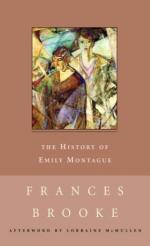|
This section contains 6,654 words (approx. 23 pages at 300 words per page) |

|
SOURCE: "Dialogism in Canada's First Novel: The History of Emily Montague," in Canadian Review of Comparative Literature, Vol. 20, Nos. 3-4, September-December, 1993, pp. 437-50.
In the following essay, Howells argues for the literary as well as the historical and documentary value of The History of Emily Montague as the first Canadian novel.
All utterance, says Bakhtin, is dialogic. Any given utterance occurs in relation to context: time, place, interlocutionary situation. It is implicitly engaged with all other utterance—reworking, replying, anticipating—and with the reality that it seeks to attain. Insofar as it incorporates multiple discourses, it is a dialogue with itself. The condition of all language is that of interaction and change: open, dynamic, ever-renewed. As such, it mimes the condition of the world. ("Monologic" utterance is the authoritarian attempt to close the dialogue, to have the final and self-consistent word, to fix the world.) Literature organises and...
|
This section contains 6,654 words (approx. 23 pages at 300 words per page) |

|


